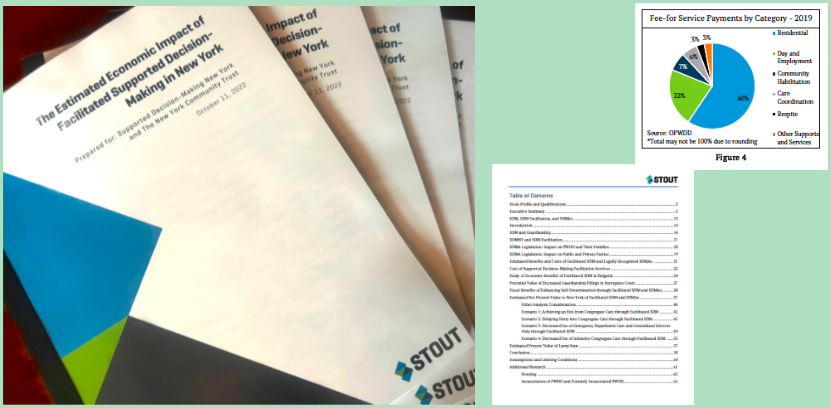We are coming toward the end of the first year of our 3-year OPWDD grant and are excited at how well it is going. We are designing and will soon begin testing a model by which the State could provide facilitation services to everyone who wants them. But, of course, the model we create, however excellent, will have significant fiscal implications–that is, it will probably cost millions of dollars a year. The next challenge is to make the case that this would be money well spent.
While we know and have demonstrated the non-monetary benefits of SDMNY facilitation and SDMAs–truly improving the lives of Decision-Makers through increased self-determination, confidence, dignity and inclusion, as well as relieving the concerns of parents and families about what will happen when they are no longer around–the State, legislators and the executive–must also be concerned about cost, over both the short and long term.
Now there is compelling evidence that SDM facilitation and SDMAs can save the State considerably more than what adopting the model we are creating will cost. With funding from the New York Community Trust we were able to commission a cost/benefit analysis by a well respected and recognized global investment and advisory firm, Stout Risius Ross, LLC, (Stout), also known for its expertise consulting on social justice issues, including access to justice. Stout has previously impacted government policy in New York (and, subsequently, Philadelphia) through its analysis of the multiple costs to the city of unnecessary evictions, resulting in greater access to legal representation for persons at risk of eviction.

In a 64-page report that has just been released, The Economic Impact of Facilitated Supported Decision-Making in New York, utilizing a “net present value scenario approach,” Stout found that
“in any reasonable distribution of scenarios where facilitated SDM is used by [people with I/DD] as an alternative to the current system, New York will recognize a significant positive economic benefit …for every dollar invested in facilitated SDM, New York could realize annual cost savings of $2.75, in addition to {all the non-monetary benefits}”
Savings would come from, among others, decreased use of guardianship (with resulting savings to the courts); delayed use of residential habilitation services and other forms of congregate care; enhanced self-determination resulting in an associated decrease of waiver-funded services; decreased emergency room visits and generally better health outcomes; increased likelihood of being enrolled in formal education; increased wages and gainful employment; reduction in administrative costs and resources associated with determination of capacity by healthcare providers, financial institutions, etc.
Importantly, the Report finds that, because many of the benefits of SDM facilitation and SDMAs “are not at this time reliably quantifiable and therefore not included in Stout’s calculations; Stout’s estimates of the economic benefits to be realized by New York are likely significantly understated.”
Thanks to the Stout Report, we now have independent expert confirmation that giving people with I/DD the supports they need to make their own decisions makes good economic sense, well worth the State’s financial investment, as well as fulfilling its commitment to enable “people with developmental disabilities [to] enjoy meaningful relationships with friends, family and others in their lives, experience personal health and growth and live in the home of their choice and fully participate in their communities.” (OPWDD Statement of Values)
An online version of the Report will soon be available on the Resources section of our website.